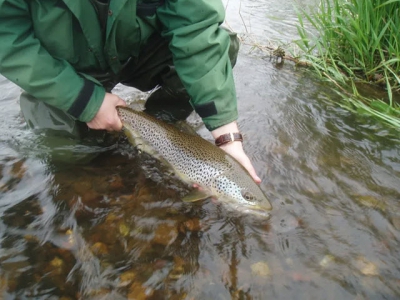Paving the way to tackle proliferative kidney disease in aquaculture

New research from the University of Aberdeen could allow the development of drugs and vaccines to treat a disease that is rapidly emerging in aquaculture as a result of climate change.
PKD affects freshwater fish, including brown trout (pictured) - both in the wild and in aquaculture
The study, which was carried out in collaboration with the University of Nottingham and the Natural History Museum and is published in Scientific Reports, is the most extensive analysis carried out on the parasite which causes proliferative kidney disease (PKD) in fish such as trout.
PKD is caused by a member of an unusual group of parasites called myxozoans that are related to jellyfish, sea anemones and corals. These very simple parasites, in contrast to most other living things, have evolved from a much more complex ancestor.
Myxozoan parasites live inside invertebrates, such as bryozoans, which live in colonies. As part of their life cycle, they will also exist in some kinds of vertebrates too.
They have made major inroads towards understanding how the parasite interacts with and exploits each host. This has provided important insights into the kind of parasite molecules that could be targeted therapeutically.
Only a minority of these parasites go on to cause serious disease in animals, such as fish, including the parasite that causes PKD, called Tetracapsuloides bryosalmonae. Rising freshwater temperatures are leading to an increase in disease instances caused by these parasites.
Researchers carrying out the study, led by Dr Jason Holland from the University of Aberdeen’s school of biological sciences, have undertaken mass sequencing of the parasite’s genes using both infected hosts in its lifecycle. In doing so, they have made major inroads towards understanding how the parasite interacts with and exploits each host. This has provided important insights into the kind of parasite molecules that could be targeted therapeutically.

Myxozoan parasites live inside invertebrates, such as bryozoans, which live in colonies. Photo: University of Aberdeen
Dr Holland said, in a press release: “Myxozoan diseases, especially PKD, are linked to increasing freshwater temperatures, with climate change being a major factor in increased disease occurrence and severity. This has, indeed, been the case within the UK, Europe and North America, impacting fisheries and aquaculture.
“Currently, there are no licensed drugs or vaccines available to control PKD and because this parasite is so fragile, there are no available means to isolate and maintain it for laboratory studies, independently of either host in its lifecycle.
“We can isolate and sequence the parasite from its invertebrate host, although this is not the case for parasite stages from the fish host. Parasite molecules that could be important therapeutic targets may be missed if we don’t obtain parasite gene sequences from both hosts. Parasite genes were distinguished from host genes by using available fish genomes and parasite genome sequence data from our collaborators at the University of Nottingham and the Natural History Museum, London.
“Our study showed that the parasite has many molecules that are completely unknown in other animals, some of which are almost exclusive to one of the two hosts in the parasite’s lifecycle. This provides a strong indicator of how important such molecules are to the parasite in each infected host, most likely in safeguarding parasite survival and exploiting the host.”

Myxozoan diseases, especially PKD, are linked to increasing freshwater temperatures, with climate change being a major factor in increased disease occurrence and severity. Photo: University of Aberdeen
Professor Okamura from the Natural History Museum, said: “Our study also paves the way towards understanding how genes may support development of highly simplified parasites. For the first time in myxozoans we have identified homeobox domain-containing proteins that play a role in development in other animals, including in jellyfish relatives, and thus may promote development in primitive myxozoans. Such genes may have been lost in the more advanced myxozoans that have been studied to date.”
The team also found that the molecules required for the parasite to thrive, such as fat digesting proteins, were highly abundant in fish, which they believe may explain what triggers disease symptoms in fish hosts.
Dr Holland continued: “This work provides an important foundation for subsequent studies to further understand why a fish’s immune system is unable to ward off the parasite, as well as in understanding its metabolism and development.
“This has the potential to lead to the development of drugs and vaccines to help control PKD in the future. Indeed, we have already used the data to inform on studies into vaccine development and have uncovered a molecule the parasite uses to attack the fish immune system, in a way that is completely novel to animal parasites”.
Related news
 Microplastics linked to gill health issues
Microplastics linked to gill health issues Fish that are subjected to chronic exposure to microplastic fibres suffer from issues including aneurysms and gill damage, according to a new study.
 Warning of organic pollutants from aquaculture
Warning of organic pollutants from aquaculture The stocking areas of farm-raised shrimps have reached 708,436 ha, equal to 102% of the same period last year. The white leg shrimp farming area
 Can probiotics solve aquaculture’s water pollution issues?
Can probiotics solve aquaculture’s water pollution issues? Multiple studies have shown that bacillus probiotics can help aquaculture producers improve fish health and performance – but can probiotics help address water